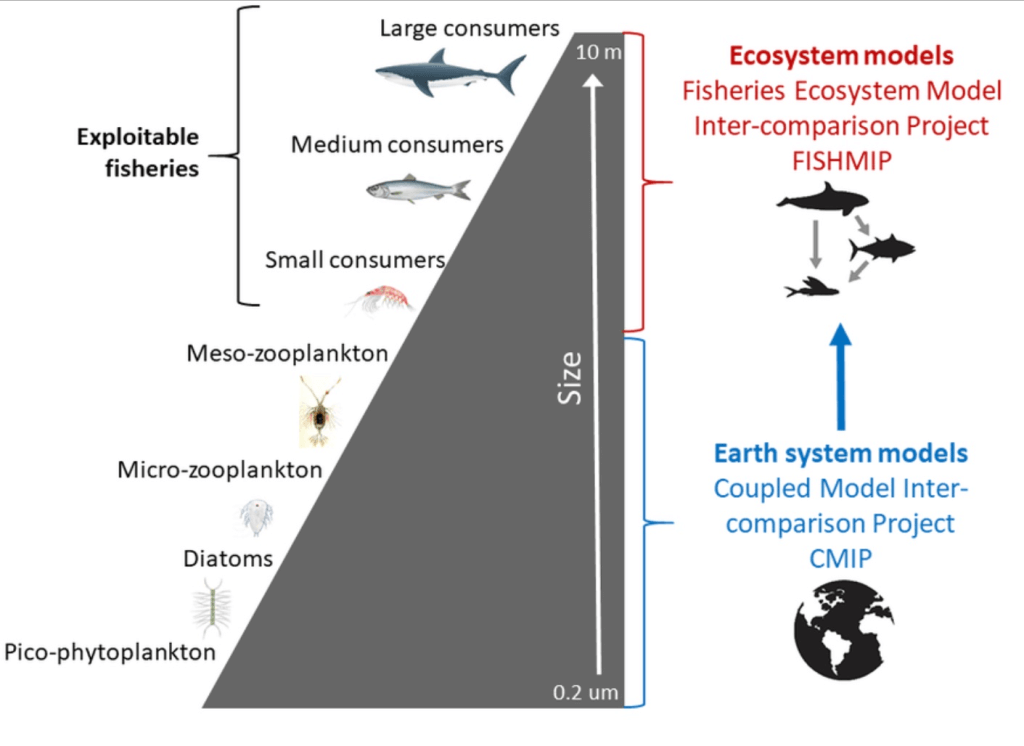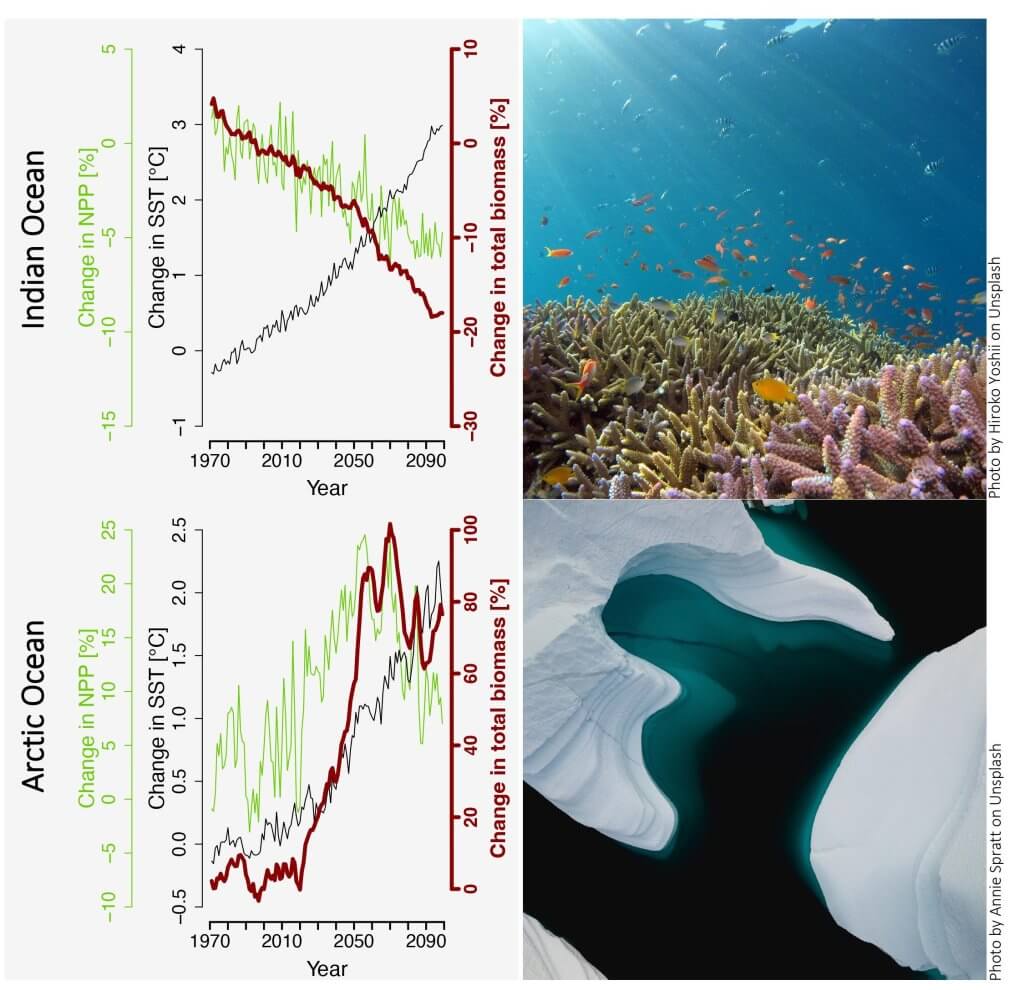
Future ocean changes: What can ecosystem models tell us?
– By Andrea Bryndum-Buchholz –
Climate change is impacting all aspects of life across the globe. Oceans are becoming warmer and more acidic causing a cascade of consequences for marine life — heightened mortality, reduced calcification, and shifts in the distribution of species are just some of the major changes that are already being observed. For example, the survival of calcifying species such as mussels, corals, even some plankton species is threatened because with increasing ocean acidity these species are less and less able to build their shells or skeletons. Other, more mobile species, such as pelagic fish or whales are moving towards habitats that are more suitable for their survival, changing overall species biomass and abundance patterns. This, in turn, can affect fisheries catches and revenue, leading to negative consequences for coastal livelihoods and well-being.
The global nature of climate change requires a global overview and understanding of future ocean responses and consequences for human livelihoods and well-being. Ecosystem models can be one tool to do just that. Ecosystem models can help to explore future responses in marine ecosystems and fisheries, from local to global scales, to ongoing climate change which can guide decision-making in ocean resource management and conservation.
By definition, an ecosystem model, is “a mathematical representation of an ecological system. It is a simplified form of a highly complex ecosystem in the real world. The ecological system can range in scale from an individual population to an ecological community, or even an entire biome.” Not all aspects can be included in models, thus each model represents only specific aspects of the ecosystem and does not capture all processes present within the system. In other words, individual ecosystem models consist of model-specific building blocks, such as species types (e.g., plankton, crabs, fish, mammals), species size classes (e.g., small, medium, large species), or functional groups (e.g., pelagic, benthic, demersal, consumers, producers). This is why each ecosystem model vary in their response to changing environmental conditions.
Combining multiple ecosystem models into an ensemble can provide a more comprehensive picture of ecosystem processes; it also allows for model advancements because individual models, which are driven by standardized input data, can be compared and assessed in terms of why projections differ due to e.g., model structure, parameters, and ecosystem processes. The Fisheries and Marine Ecosystem Model Intercomparison Project (Fish-MIP, Image 1), an international network of more than 40 marine ecosystem modellers, is spearheading ensemble modelling of marine ecosystems to shed light on the long-term impacts on climate change on fisheries and marine ecosystems, on regional and global scales.

Fish-MIP results are used to help inform climate and environmental policy, such as through the United Nations (UN) Intergovernmental Panel on Climate Change (IPCC) Special Report on the Ocean and Cryosphere in a Changing Climate; the UN IPCC Sixth Assessment Report; and the UN Intergovernmental Panel on Biodiversity and Ecosystem Services (IPBES) Global Assessment Summary for Policy Makers. Here, Fish-MIP provided information on e.g., how the abundance of marine animals across the global ocean may change under ongoing climate change; how marine ecosystem responses differ depending on the ocean basin under climate change, where changes in the Indian Ocean differed substantially from projected changes in the Arctic Ocean (Image 2).

While these ensemble projections help to understand future trajectories of ocean changes, the underlying uncertainties in the projections and limitations that exist often hold back policy development and on the ground decision-making. One of the main limitations being spatial resolution of model projections, that do often not match the scale of ocean policy or management.
Nevertheless, decades of climate-impact research have highlighted, documented, and discussed climate change impacts on our planet to be certain enough about the consequences of inaction on humanity. A shift in the global mindset and political will to act on climate change is required to avoid increasingly catastrophic events such as floodings, wildfires, hurricanes, or heatwaves. This shift is needed now despite of the uncertainty in what the future might bring, despite of the uncertainty in model projections. Acknowledging the uncertainty in the science, can still provide science-based advice and science-informed decision-making.
Ecosystem models will continue to advance and will continue to inform climate and environmental policy. Increasing computing power will allow for higher complexity in model structures and hence a higher complexity in the representation of ecosystem components. Underlying model uncertainty will likely not disappear, but as model results are communicated in effective ways that focus on climate risks instead of uncertainty, climate action will hopefully become stronger and more immediate.
Andrea (She/Her) is a Postdoctoral Fellow at the Fisheries & Marine Institute, Memorial University of Newfoundland, with the Ocean Frontier Institute (OFI) and Marine Environmental Observation Prediction & Response Network (MEOPAR). She is interested in understanding future changes in marine ecosystems due to ongoing climate change, assessing consequences and finding solutions for fisheries management and marine biodiversity conservation in a changing ocean. Andrea is interested in science communication and is a passionate writer.
Twitter: @AndreaBBuchholz
